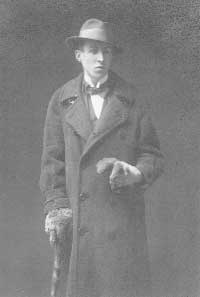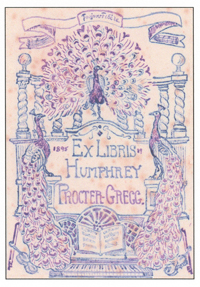
- 7 clarence grove
- horsforth
- leeds, LS18 4LA
- UK
- tel: 0113 258 1300
- order online
- www.editiondb.com
- info@editiondb.com
- Back to catalogue
- Back to biography
- Recordings
- List of works
- P-G's school days
- Performances
- Memoirs
- Auto-biographical note
- Reviews
Procter-Gregg obituary (1980)
Death of Beecham’s Friend
Sunday, 13 April saw the end of an era with the passing of Humphrey Procter-Gregg C.B.E at a Grange-over-Sands nursing home. Teacher, composer, friend and colleague and, later, biographer of Beecham; first Professor of Music at Manchester; Director of the London Opera Centre: these reflect but a partial view of his long, energetic life.
Born in 1895 at Fairbank Cottage in Kirkby Lonsdale, P-G, as he was affectionately known to his friends, became a student at Cambridge and the Royal College of Music, showing talent in composition and opera production.
His work in this latter field during the twenties and thirties included many landmarks in English opera: the first production of ‘Hugh the Drover’ by Vaughan Williams, and the famous Beecham period at Covent Garden. The result of his work with Beecham was a life-long devotion to ‘Tommy’ and a determination after his death to attempt to preserve his influence on English musical life: this unswerving dedication to the memory of the greatest of conductors eventually came to fruition in two books on Sir Thomas and the donation of the magnificent bronze bust by Michael Rizzello in the foyer of Covent Garden, unveiled just a year ago.
P-G’s contribution to academic life was nearly thirty years at Manchester University, where he became its first music Professor. During these years he enriched the musical life of the city with many fine concerts and was responsible for the formation of a University quartet (the Ad Solem), a novel concept at that time. He gave total dedication to everything he undertook, and his teaching was no exception. On his retirement he became Artistic Director of the Carl Rosa Opera and then director of the newly established London Opera Centre in 1962.
From thence, in 1964, to the Windermere period of so-called ‘retirement’. With characteristic energy he immersed himself in composition anew, revision of his earlier works, and the preparation of two dozen or so important opera libretti translations for the International Music Company of New York, as well as the two recreations which gave him so much pleasure throughout his life – painting and gardening.
His compositions span more than sixty years: some early piano études date from the First World War years, and his last achievement was a complete re-working of a fine set of Variations on an ‘Air from Aberdeenshire’ for violin and piano.
Shunning all forms of self-promotion, nearly all his works are as yet unpublished, though there have been acclaimed performances of his piano preludes, etudes and various sonatas for oboe, clarinet, horn, viola and violin, amongst others. His outstanding melodic and harmonic gifts are encapsulated in the four books of ‘Westmoreland Sketches’ – twenty-six exquisite miniatures reflecting the everchanging colours and moods of his beloved Lakeland landscape.
Awarded the C.B.E. in 1972 for services to music, P-G leaves no immediate family: but a host of indebted colleagues, former students and friends in all walks of life who will treasure his memory.
__________________________________________________________________________________________
Several of Humphrey Procter-Gregg's compositions have recently been recorded on the Dutton Epoch label.
Clarinet Concerto on Dutton CDLX 7153 - Ian Scott (clarinet) and the Royal Ballet Sinfonia conducted by Barry Wordsworth. CD Review
Sonata No.3 for violin and piano on Dutton CDLX 7165 - Richard Howarth (violin) and Ian Buckle (piano)
Sonata for clarinet and piano on Dutton CDLX 7165 - Nicholas Cox (clarinet) and Ian Buckle (piano)
Sonata for horn and piano on Dutton CDLX 7165 - Bob Ashworth (horn) and Ian Buckle (piano)
Westmoreland Sketches (Nos.23-26) on Dutton CDLX 7165 - Ian Buckle (piano)
- Back to catalogue
- Back to biography
- Recordings
- List of works
- Auto-biographical note
- P-G's school days
- Performances
- Memoirs

Procter-Gregg in 1918

P-G's bookplate